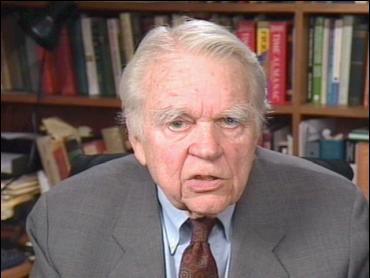Everyone agrees.
Andy Rooney, who died at the age of 92 last week, was a curmudgeon.
The CBS correspondent, who had become an icon to Americans if not the world for delivering intemperate, grouchy, funny and sometimes controversial commentaries from 1978 to 2011, made his attitude of irritation and annoyance so much a part of his shtick, that he turned it into a profession.
As in: Curmudgeon Andy Rooney dies at 92. The word or variations on that theme—the New York Times headlined him the “Cranky Voice of CBS”—unquestionably made its way into numerous headlines across the land.
Rooney, in an interview with 60 Minutes Colleague Morley Safer, saw himself as a writer, not a man with an attitude. But it was the attitude, hitched to a man who could rumple brand new clothes in seconds, sitting behind a rumpled desk, looking at the audiences out from under a set of imposing, bristling eyebrows with baleful eyes, which endeared himself to audiences as much as what he had to say.
Remembering some of his “spoken essays,” and some of the comments he made to Safer about refusing to give autographs, or his low opinions of fan mail he received, I suspect the curmudgeon was no act. I suspect that he highlighted his curmudgeon credentials with relish, it was authentic to a fault, and as such things often happen in mysterious ways, the quality came across on television in a way that made him a beloved everyman, where the same quality might make you want to grimace in person.
Rooney wrote about himself, or rather how he dealt with daily life, and all of its annoyances from cereal boxes too big for the meager amount of cereal they contained to the omnipresence of hefty phone books, the commercialization and preponderance of useless products, the mystery of keys and why they wouldn’t turn. He had no patience for youth culture and refused to take it seriously. Those kinds of rants received an affectionate and recognizable hearing from a huge audience, the rest of us out there, especially, you suspect, men who got set in their ways around the age of ten on certain matters. He spoke the frustrating rant and language that a long-married man might speak over breakfast, with the spouse nodding ‘yes, dear,’ who is bewildered by the mysteries of a can opener.
He was of course much more serious than Paul Revere warning of the coming of the fall of civilization. There’s an element of the truism that as you get older, the past seems rosier than it was, and the future looks bleak, which of course it does, giving where age in the end brings us. He had strong and powerful opinions about events and people, and never lacked courage in saying what he thought needed saying, hence his take on the “Shock and Awe” start of the second Gulf war: “We didn’t shock them, and we didn’t awe them in Baghdad. The phrase makes us look like foolish braggarts. The president ought to fire whoever wrote that for him.”
Rooney, you can fairly suspect, had an intemperate temperament, probably gained honestly. An avowed pacifist, he was part of that Tom Brokaw, dubbed Greatest Generation which served in World War II, in his case as a war correspondent for Stars and Stripes. He accompanied bomber crews on raids into Germany, deliberately putting himself into harm’s and flak’s way. He started out as a writer—including working for loveable and sometimes curmudgeonal Arthur Godfrey before landing a job with CBS.
He got into trouble more than once, as curmudgeons often do with rash judgments and comments about gays, African Americans, women—he didn’t think they should be sideline reporters at football games—and Kurt Cobain. Statements which he sometimes regretted because they rode against the grain of his self-described liberalism.
But he could also be generous, and eloquent, as when he wrote about the crew of the space shuttle Challenger, which blew up after takeoff in 1986. “We can all be prouder to be human beings l because that’s what they were. They make up for a lot of liars cheats and terrorists among us.”
Andy Rooney died of serious complications from surgery. He made his last appearance on 60 Minutes on Oct. 2 of this year.
In the Safer interview, Rooney said he thought about death a lot. “I don’t like it,” he said.
Me neither. On this matter, we are all curmudgeons.


